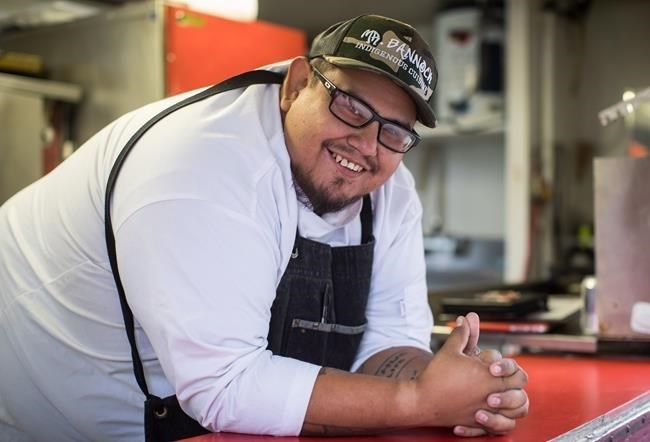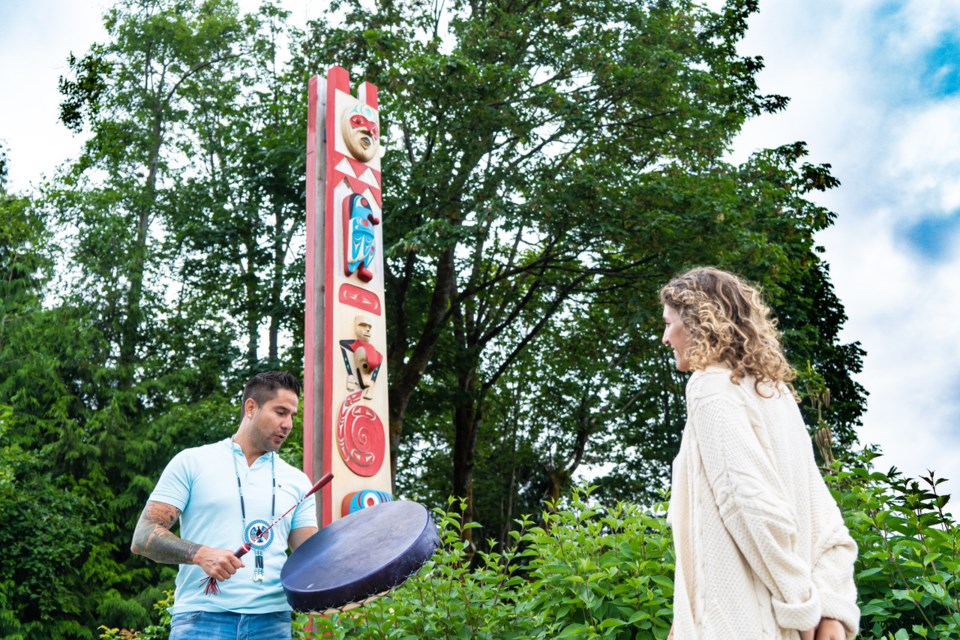Whether it’s sampling some tasty Indigenous cuisine from the renowned Mr. Bannock food truck or paddling out to sea at Whey-a-wichen (Cates Park), there are many ways to embrace First Nations culture on the North Shore.
As June marks National Indigenous History Month, British Columbians are being encouraged to celebrate with an “open heart and open mind” in a pandemic safe way this year.
The month-long celebration of First Nations, Inuit, and Métis peoples culture was first introduced in 2009, as a way to educate, connect and promote reconciliation in Canada. Prior to this, in 1996, National Indigenous Peoples Day was declared, with the date of June 21 chosen to coincide with the summer solstice and the start of berry-picking and fishing season.
With COVID-19 in mind, there are plenty of virtual ways to embrace Indigenous culture in June from the comfort of your couch or, for those who would like to venture out, there are opportunities to taste Indigenous cuisine, visit museums and get outdoors and connect with the land.
As travel restrictions are still in place across the province, Indigenous Tourism BC, in partnership with Destination BC, is opening peoples’ eyes up to the vast First Nations history and ways of being through a series of virtual workshops.
The series aims to help facilitate deeper connections between Canadians and Indigenous culture, as well as showcase businesses and raise awareness of the province’s Indigenous travel experiences.
“We’ve secured a group of exceptional individuals who will share their stories, and we invite participants across BC and abroad to dive deeper into prominent themes of Indigenous cultures,” Brenda Baptiste, Chair of ITBC, said. “We hope these online events will inspire the community to learn now and visit later to support Indigenous businesses and experience our history and traditions firsthand.”
Feel a connection to the land
For, Whonoak, Dennis Thomas, the business development manager of Takaya Tours – a seasonal tour company that offers a chance to experience the culture, tradition, and history of the Tsleil-Waututh Nation in North Vancouver – sharing Indigenous culture is a part of everyday life.
Thomas will be passing on his ancestral knowledge and talking about how nature and sustainability, through an Indigenous worldview, contribute to social wellbeing during ITBC’s Honouring Wellness virtual workshop on Tuesday, June 22 at 2 p.m.
Along with Thomas, Frank Antoine, co-founder of the Okanagan’s Moccasin Trails, will host a smudging ceremony and attendees will learn about the colonization of Indigenous wellness practices.
Thomas said for many First Nations, social wellbeing was tied to their connection to the land.
“The water, the wind, the air, the fire, these are all cultural elements that my nation, as well as other Indigenous nations, have a deep connection to,” he said, adding that through storytelling, traditional ways of being and living on the land had been passed down for generations.
“We took only what we needed from the land.”
Thomas feels National Indigenous History Month is a “positive step in the right direction for reconciliation and self-determination.”
“I think it's great to be telling our stories in a positive way to people that have open hearts and open minds to listen,” he said.
Those who enjoy getting outdoors and connecting with nature can also hire a kayak and explore Tsleil-Waututh’s sacred site, Whey-a-wichen, Cates Park, or take a stroll through the park and check out the various Indigenous art pieces along the way on a self-guided tour. Takaya also offers a variety of cultural tours and is hoping to bring back its traditional 35-foot canoe experience this summer.
Or, you could go on a self-guided tour created by Wild Bird Trust of B.C. of the Maplewood Flats Conservation Area, which is home to a Tsleil-Waututh Nation ancestral village site. The mudflats provided food security for the TWN and were managed for fish, shellfish, waterfowl and other resources.
Those interested in Indigneous plants can also go on a virtual scavenger hunt through the conservation area.
Authentic cultural and eco-tourism experiences and virtual tours are also available through Talaysay Tours. First Nation guides share ancient and contemporary stories, legends, and Aboriginal ways of living at Stanley Park and surrounding Vancouver areas.
Indulge in Indigenous food culture
As well as learning about connections to the land and wellness, there’s also an opportunity to indulge in a little Indigenous food culture.
Showcasing Indigenous food is always at the top of chef Paul Natrall’s list. The Squamish Nation member is the owner of North Vancouver’s award-winning Mr. Bannock food truck and catering.
He’ll be sharing his knowledge and secrets to making the best bannock with viewers during the Tasting of Indigenous Cultures virtual workshop on Tuesday, June 15 at 2 p.m.
The workshop will offer an exploration of the rich history and cultures of Indigenous cuisine and wine in B.C. As well as Natrall, viewers will also meet Ryan Widdup, manager and sommelier of the Okanagan’s Indigenous World Winery, who will share the history and practices behind Indigenous wine.
“I try to showcase our food culture all the time, but it just so happens that in June, people tend to enjoy it and showcase it a bit more,” Natrall said.
“It means a lot to be able to have a little spotlight on what we do for Indigenous food culture.”
The second-generation chef, who sits on the board of Indigenous Culinary of Associated Nations and was a co-founding member, said while awareness around Indigenous food was growing in B.C. there was still a long way to go.
“The biggest thing is there's still a big gap in Indigenous food culture,” Natrall said. “Back in 2018, I opened Vancouver’s first Indigenous food truck and now we're here in 2021 and I'm still the only Indigenous food truck.
“So, showcasing my version of Indigenous food culture in Vancouver is huge.”
 Squamish Nation Chef Paul Natrall poses in the Mr. Bannock food truck. photo The Canadian Press / Darryl Dyck
Squamish Nation Chef Paul Natrall poses in the Mr. Bannock food truck. photo The Canadian Press / Darryl DyckHe said he was looking forward to sharing his passion for Coast Salish fusion street food and some ancient cooking methods – stone baking, clay baking, smoking, curing, drying – with viewers.
Natrall said he hadn’t decided what he’ll be cooking as part of the ITBC virtual workshop yet but he hopes people will tune in to find out, as well as go out and try some Indigenous food.
“Just get out in the community, COVID restrictions obviously apply, but go and enjoy some food and some culture because there's a lot of different, awesome things going on and the tourism industry really needs support right now. So, get out and enjoy locally.”
He also offers virtual online cooking lessons and various pre-packaged Indigenous foods for sale on the Mr. Bannock website, including his classic bannock mix, chocolate bark, cinnamon sugar mix, and a smoked spice rub.
Those hungry for more can also stop by the Mr. Bannock Food truck for a bite to eat at 442 West 1st Street, North Vancouver, on Fridays from 4 p.m. to 6 p.m. There, visitors can try his famous bannock, be surprised by a rotating fusion specialty dish, enjoy a handcrafted burger or a classic bannock taco – among other delights.
Another spot to indulge in some First Nations flavour is Salmon n’ Bannock, Vancouver's only Indigenous restaurant. The intimate eatery at 1128 West Broadway, serves a modern take on Pacific Northwest Indigenous cuisine with authentic flavours.
Inez Cook, the restaurant's owner, said they would once again be hosting a salmon barbecue to celebrate Indigenous Peoples Day, Father's Day, and the Summer Solstice from June 19 to 21.
Celebrate Indigenous arts and culture
As part of ITBC’s virtual series there is also a Celebrating Living Indigenous Arts & Culture workshop on Thursday, June 17 at 2 p.m. The event allows viewers to travel virtually to the U’mista Cultural Centre in Alert Bay, B.C. with Sara Fulla, to learn about the history and cultural significance of Potlatches as well as the artistic practices of cedar weaving, song and dance. Viewers will then be transported to the remote Great Bear Rainforest in Klemtu, B.C. where they will meet Sierra Hall at Spirit Bear Lodge.
For those who’d like to get out of the house and experience First Nations arts and culture, reservations can be made to visit the University of British Columbia’s Museum of Anthropology. The museum’s Great Hall features First Nations sculptures, textiles, bentwood boxes, feast dishes and canoes from the Northwest Coast. The space also displays large poles, house posts and carved figures, mostly from the mid-19th century.
Many First Nations art pieces can also be spotted across the North Shore and can be found on the North Shore Culture Compass map.
The Royal BC Museum is also home to thousands of spectacular photographs, films, recordings and objects showcasing the many First Nations cultures in B.C., some of which can be viewed online.
More free virtual learning can be found on the Squamish Lil’wat Cultural Centre website.
The thriving centre, which educates youth and visitors from around the world about the Sk̲wx̲wú7mesh (Squamish) and L̓il̓wat7úl (Lil’wat) Nations – the two First Nations that share the territory – began offering more virtual experiences when the pandemic hit.
“We have covered a broad scope of topics: how-to crafts such as wool woven headbands and medicine bags, art as an outlet of expression, storytelling, supporting community during COVID-19, and traditional regalia making,” Mandy Rousseau, manager of marketing and communications, said.
“By taking a moment to engage with the SLCC online, the audience will walk away with a deeper understanding of not only Sk̲wx̲wú7mesh Úxumixw and Lil̓wat7úl, but Indigenous people across Canada.
“This positions us as a part of Canada’s Truth and Reconciliation process, too, and we’re keen to support those interested in the path forward.”
Learn more by visiting Celebrating National Indigenous History Month or by reading one of the books from the #IndigenousReads reading list.
Elisia Seeber is the North Shore News’ Indigenous and civic affairs reporter. This reporting beat is made possible by the Local Journalism Initiative.



